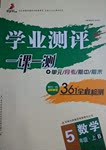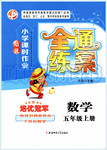
 学业测评一课一测系列答案
学业测评一课一测系列答案 小学课时作业全通练案系列答案
小学课时作业全通练案系列答案科目:高中英语 来源: 题型:050
Foreign visitors are often puzzled in Japan because most streets there don't have name.In Japan,people use landmarks in their directions instead of street names.For example,the Japanese will say to travelers, “Go straight down to the corner. Tun left at the big hotel and go pass a fruit market. The post office is across from the bus stop.”
In the countryside of the American Midwest,usually there are not many landmarks. There are no mountains, so the land is very flat(平坦的). In many places there are no towns or buildings with tell you directions and distance. In Kansas or Iowa, for example, people will say, “Go north two miles. Turn east,and then go another mile.”
People in Los Angeles, California, have no idea of distance on the map: They measure distance by means of time, not miles. “How far away is the post office?” you ask. “Oh,” they answer, “It's about five minutes from here.”you say, “It's about five minutes from here.” You say, “Yes, but how many miles away is it?” They don't know.
Peop;e in Greece sometimes do not even try to give directions because visitors seldom understand thi Greek language. Instead of giving you the direction, a Greek will often say, “Follow me.” Then he'll lead you through the streets of the city to the post office.
Sometimes a person doesn't know the answer to your question, What happens in this situation? A New Yorker might say, “Sorry, I have no idea.” But in Yucatan, Mexico, no one answers, “I don't know.” People in Yucatan think that “I don't know” is impolite. They usually give an answer, often a wrong one.A visitor can get very, very lost in Yucatan!
One thing will help you everywhere-in Japan, in the United States in Greece, in Mexico, or in any other place. You might not understand a person's words, but maybe you can understand his body language. He or she will usually turn and then point in the correct direction. Go iin that direction, and you may find the post office!
1.The passage mainly tells us that_______.
A.never carry a map for travel
B.there are not many landmarks in the American Midwest
C.there are different ways to give directions in different parts of the world
D.New Yorkers often say, “I have no idea,” but people in Yucatan, Mexico, never say this
2.In which place do people tell distance by means of time?
A.Japan.
B.American Midwest.
C.Los Angeles,California.
D.Greece
3.In the passage,_______countries are mentioned by the writer.
A.seven B.four C.eight D.five
4.Which of the following is wrong?
A.Travelers can learn about people's customs by asking questions about directions.
B.A person's body language can help you understand directions.
C.People in some places give directions in miles, but people in other places give directions by means of time.
D.People in different places always give directions in the same way: They usr street namees.
查看答案和解析>>
科目:高中英语 来源:河北省邢台一中2011-2012学年高二下学期第四次月考英语试题 题型:050
| |||||||||||||||||||||||||||||||||||||||||||||||||||||||||||
查看答案和解析>>
科目:高中英语 来源:河北省邢台一中2011-2012学年高二下学期第四次月考英语试题 题型:050
| |||||||||||||||||||||||||||||||||||||||||||||
查看答案和解析>>
科目:高中英语 来源:2010年高三备考英语“好题速递”系列试题(2) 题型:阅读理解
Like a growing number of young women in Vietnam’s northern part city of Haiphong, Pham Thi Hue was infected with HIV by her husband, one of the town’s many drug users.But instead of being shamed into silence, as Vietnamese with HIV and AIDS are, the 25-year-old tailor and mother of one went public, appearing on television and at conferences.Her business suffered and her neighbors insulted (辱骂)her, but Hue has now become the public face of Mothers and Wives, an HIV/ AIDS support group established in Haiphong by a Norwegian nongovernmental organization and her neighborhood’s People’s Committee.Last year, she founded a smaller group named after a local flower.People who need advice on treatment or help preparing bodies for burial can dial a hot line and get assistance from able and sympathetic(同情的)HIV victims.“We gather to support each other,” Hue says.“When we are sick, what we need most is encouragement and comfort from people who understand our situation and are willing to share our happiness, as well as our sadness.”
On a hot and damp night last month, Hue welcomed into her small home a very thin woman, also a tailor, who was HIV positive.The woman tearfully told Hue that she had not told anyone about her condition, fearing that she would lose customers and that her daughter would be insulted at school.Hue became the wise elder, offering medical and personal advice.
40.What did Pham Thi Hue do after she was infected with HIV?
A.She kept silent
B.She worked as usual
C.She stayed at home and cried every day.
D.She went public and gave help to others.
41.It can be inferred from the passage that the group Pham Thi Hue founded is made up of____.
A.drug users B.HIV victims
C.all kinds of patients D.poor people
42.From the passage we can learn that Pham Thi Hue is a woman who is_______.
A.weak and kind B.foolish and idle
C.brave and helpful D.cautious and energetic
查看答案和解析>>
科目:高中英语 来源:安徽省期中题 题型:完形填空
| 完形填空 | |||
One aft ernoon I was sitting at my favorite table in a restaurant, waiting for the food I had ernoon I was sitting at my favorite table in a restaurant, waiting for the food I had ordered to arrive. Suddenly I 1 that a man sitting at a table near the window kept glancing in my direction, _ 2 he knew me. The man had a newspaper 3 in front of him, which he was 4 to read, but I could 5 that he was keeping an eye on me. When the waiter brought my 6 , the man was clearly puzzled by the 7 way in which the waiter and I 8 each other. He seemed even more puzzled as 9 went on and it became 10 that all the waiters in the restaurant knew me. Finally he got up and went into the 11 . When he came out, he paid his bill and 12 without another a glance in my direction. I called the owner of the restaurant and asked what the man had 13 . "Well, "he said, "That man was a detective(侦探). He 14 you here because he thought you were the man he 15 ." "What ?"I said, showing my 16 . The owner continued, "He came into the kitchen and showed me a photo of the wanted man. I 17 say he looked very much like you! Of course since we know you, we told him that he had made a __18_." "Well, it's really 19 I came to a restaurant where I'm known, "I said. " 20 , I might have been in trouble." | |||
| ( )1.A. knew ( )2.A. since ( )3.A. flat ( )4.A. hoping ( )5.A. see ( )6.A. menu ( )7.A .direct ( )8.A. chatted with ( )9.A. the waiter ( )10.A. true ( )11.A. restaurant ( )12.A. left ( )13.A. wanted ( )14.A. met ( )15.A. was to beat ( )16.A. care ( )17.A. must ( )18.A. discovery ( )19.A. a pity ( )20.A. Thus |
B. unders tood B. even if B. open B. thi nking B. find B. bill B. familiar B. looked at B. time B. hopeful B. washroom B. acted B. tried B. caught B was dealing with B. surprise B can B mistake B natural B However |
C. noticed C .though C. cut C. pretending C. guess C. paper C. strange C. laughed at C. I C .clear C. office C. sat down C. ordered C. followed C. was to meet C. worry C. need C decision C. a chance C.Otherwise |
D.recognized? D.as if? D. fixed ? D.continuing? D. learn? D. food ? D. funny ? D. talked about D. the dinner D. possible D .kitchen? D. calmeddown D. wished? D. discovered? D. was looking for D. regret? D. may? D. fortune? D. lucky? D. Therefore |
查看答案和解析>>
湖北省互联网违法和不良信息举报平台 | 网上有害信息举报专区 | 电信诈骗举报专区 | 涉历史虚无主义有害信息举报专区 | 涉企侵权举报专区
违法和不良信息举报电话:027-86699610 举报邮箱:58377363@163.com